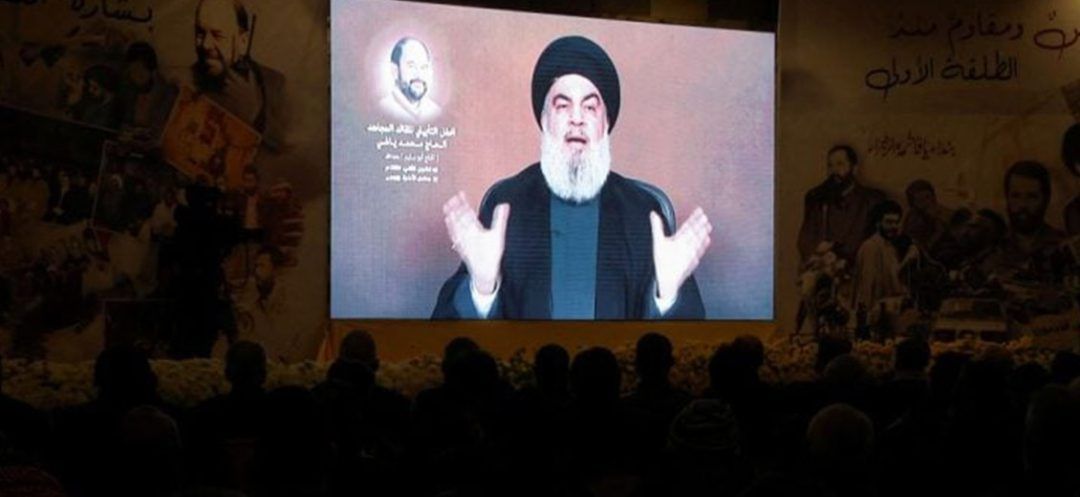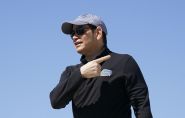- Home
- War in the Middle East
- Israel Announces Hassan Nasrallah's Death, Hezbollah Remains Silent

The Israeli Arabic-speaking spokesperson Avichay Adraee announced on Saturday at 11 AM to have “eliminated” Hezbollah’s Secretary General Hassan Nasrallah.
“Yesterday, the Israeli Defense Forces (IDF) eliminated Hassan Nasrallah, Hezbollah's leader and one of its founders. The Israeli Army also neutralized Ali Karaki, Hezbollah’s commander of the southern front, along with several other Hezbollah leaders,” he added.
He said that the Israeli air force planes, guided by precise intelligence from the Military Intelligence Directorate, targeted Hezbollah’s central underground headquarters, located beneath a residential building in the southern suburb of Beirut (Dahyeh).
“The strike was carried out while Hezbollah’s leadership was inside the headquarters coordinating activities against Israeli citizens,” Adraee said.
He considered that for 32 years of leading the organization, “Nasrallah was responsible for the deaths of a large number of Israeli citizens and Israeli soldiers, as well as for planning and executing thousands of operations against the State of Israel and around the world.”
“Nasrallah was the main decision-maker in the organization, holding sole and final authority over all strategic decisions made by Hezbollah, and at times even tactical ones,” he added.
Adraee pointed out that the Israeli Army “will continue to target anyone who promotes or is involved in terrorist activities against the citizens of the State of Israel.”
Hezbollah’s official TV station, Al-Manar, has still not commented on his state until today, Saturday.
Reuters cited on Friday night an Iranian security official saying Tehran was checking his status.
Friday’s Conflicting News on Nasrallah’s Fate
The Israeli Army carried out massive targeted airstrikes in Beirut’s southern suburbs on Friday evening, with the military saying it had struck Hezbollah’s main headquarters. An Israeli official confirmed to The Times of Israel that the strikes targeted Hezbollah Secretary General Hassan Nasrallah, who was believed to be at the command center at the time.
“It’s very hard to imagine him coming out alive from a strike like that,” said the Israeli official on Friday, as multiple Israeli media reports cited a growing Israeli assessment that Nasrallah was killed in the strike on the underground headquarters.
Multiple strikes resulted in numerous casualties, according to reports. A source close to Hezbollah stated that six buildings were leveled by the Israeli strikes, marking the most intense assault on Beirut in nearly a year of conflict between Hezbollah and Israel. However, they did not comment on the Secretary General’s fate. Israeli television networks reported that the attack involved bombs carrying tens of tons of explosives."
A Lebanese security source told Reuters on Friday that Hezbollah’s top officials are usually gathered at the site that was targeted.
Moreover, the Israeli spokesman Daniel Hagari gave an on-camera statement minutes afterward. Hagari said the command center was built underneath civilian buildings in Dahyeh. He did not mention whether Nasrallah was a target or was believed to be present at the site.
Shortly after the strikes, sources close to Hezbollah told AFP and Reuters that Nasrallah was alive, while Reuters cited an Iranian security official saying Tehran was checking his status.
High-Powered Bunker-Busting Bombs
Imagery from Beirut’s Dahyeh district on Friday night suggests that Israeli airstrikes on Hezbollah’s command center employed high-powered bunker-busting bombs, weighing nearly a ton each, and in significant quantities, according to Yedioth Ahronoth.
These bombs are believed to be capable of penetrating several feet of concrete and tens of feet of earth. The strikes were spread across thousands of square feet, both above and below ground, the Israeli media added.
Yedioth Ahronoth stated that such bombs cause severe damage to targets, making identification of casualties extremely challenging. The intensity of the blast, combined with the debris and heat generated, complicates efforts to confirm the number of people affected, especially when the target is buried under massive layers of rubble.
The US & Netanyahu
As news emerged of the strike, Israeli Prime Minister Benjamin Netanyahu left a briefing with Israeli reporters after his speech at the United Nations.
A US official told The Times of Israel that Israel notified the US about the airstrike after planes were already in the air and the operation was in motion.
A Pentagon spokesperson said US Defense Secretary Lloyd Austin spoke with his Israeli counterpart Yoav Gallant as the operation was ongoing.
“The United States was not involved in this operation, and we had no advance warning,” spokesperson Sabrina Singh said.
The Impact
Nasrallah’s death by the Israelis (if confirmed) could significantly impact Lebanon’s internal political dynamics, with implications for Israel, according to Yedioth Ahronoth. If confirmed, the Shiite community would be left with one key leader of Nasrallah’s stature: Nabih Berri, the Speaker of the Lebanese Parliament and head of the Shiite Amal Movement, from which the more radical Hezbollah emerged, noted Ynet.
According to the Israeli media, if Nasrallah was indeed killed, the US would likely engage directly with the Lebanese government and Berri, as the perceived link between a ceasefire in northern Israel and a ceasefire in Gaza may be severed, potentially freeing Berri and the government to negotiate more openly.
“Yesterday, the Israeli Defense Forces (IDF) eliminated Hassan Nasrallah, Hezbollah's leader and one of its founders. The Israeli Army also neutralized Ali Karaki, Hezbollah’s commander of the southern front, along with several other Hezbollah leaders,” he added.
He said that the Israeli air force planes, guided by precise intelligence from the Military Intelligence Directorate, targeted Hezbollah’s central underground headquarters, located beneath a residential building in the southern suburb of Beirut (Dahyeh).
“The strike was carried out while Hezbollah’s leadership was inside the headquarters coordinating activities against Israeli citizens,” Adraee said.
He considered that for 32 years of leading the organization, “Nasrallah was responsible for the deaths of a large number of Israeli citizens and Israeli soldiers, as well as for planning and executing thousands of operations against the State of Israel and around the world.”
“Nasrallah was the main decision-maker in the organization, holding sole and final authority over all strategic decisions made by Hezbollah, and at times even tactical ones,” he added.
Adraee pointed out that the Israeli Army “will continue to target anyone who promotes or is involved in terrorist activities against the citizens of the State of Israel.”
Hezbollah’s official TV station, Al-Manar, has still not commented on his state until today, Saturday.
Reuters cited on Friday night an Iranian security official saying Tehran was checking his status.
Friday’s Conflicting News on Nasrallah’s Fate
The Israeli Army carried out massive targeted airstrikes in Beirut’s southern suburbs on Friday evening, with the military saying it had struck Hezbollah’s main headquarters. An Israeli official confirmed to The Times of Israel that the strikes targeted Hezbollah Secretary General Hassan Nasrallah, who was believed to be at the command center at the time.
“It’s very hard to imagine him coming out alive from a strike like that,” said the Israeli official on Friday, as multiple Israeli media reports cited a growing Israeli assessment that Nasrallah was killed in the strike on the underground headquarters.
Multiple strikes resulted in numerous casualties, according to reports. A source close to Hezbollah stated that six buildings were leveled by the Israeli strikes, marking the most intense assault on Beirut in nearly a year of conflict between Hezbollah and Israel. However, they did not comment on the Secretary General’s fate. Israeli television networks reported that the attack involved bombs carrying tens of tons of explosives."
A Lebanese security source told Reuters on Friday that Hezbollah’s top officials are usually gathered at the site that was targeted.
Moreover, the Israeli spokesman Daniel Hagari gave an on-camera statement minutes afterward. Hagari said the command center was built underneath civilian buildings in Dahyeh. He did not mention whether Nasrallah was a target or was believed to be present at the site.
Shortly after the strikes, sources close to Hezbollah told AFP and Reuters that Nasrallah was alive, while Reuters cited an Iranian security official saying Tehran was checking his status.
High-Powered Bunker-Busting Bombs
Imagery from Beirut’s Dahyeh district on Friday night suggests that Israeli airstrikes on Hezbollah’s command center employed high-powered bunker-busting bombs, weighing nearly a ton each, and in significant quantities, according to Yedioth Ahronoth.
These bombs are believed to be capable of penetrating several feet of concrete and tens of feet of earth. The strikes were spread across thousands of square feet, both above and below ground, the Israeli media added.
Yedioth Ahronoth stated that such bombs cause severe damage to targets, making identification of casualties extremely challenging. The intensity of the blast, combined with the debris and heat generated, complicates efforts to confirm the number of people affected, especially when the target is buried under massive layers of rubble.
The US & Netanyahu
As news emerged of the strike, Israeli Prime Minister Benjamin Netanyahu left a briefing with Israeli reporters after his speech at the United Nations.
A US official told The Times of Israel that Israel notified the US about the airstrike after planes were already in the air and the operation was in motion.
A Pentagon spokesperson said US Defense Secretary Lloyd Austin spoke with his Israeli counterpart Yoav Gallant as the operation was ongoing.
“The United States was not involved in this operation, and we had no advance warning,” spokesperson Sabrina Singh said.
The Impact
Nasrallah’s death by the Israelis (if confirmed) could significantly impact Lebanon’s internal political dynamics, with implications for Israel, according to Yedioth Ahronoth. If confirmed, the Shiite community would be left with one key leader of Nasrallah’s stature: Nabih Berri, the Speaker of the Lebanese Parliament and head of the Shiite Amal Movement, from which the more radical Hezbollah emerged, noted Ynet.
According to the Israeli media, if Nasrallah was indeed killed, the US would likely engage directly with the Lebanese government and Berri, as the perceived link between a ceasefire in northern Israel and a ceasefire in Gaza may be severed, potentially freeing Berri and the government to negotiate more openly.
Read more



Comments